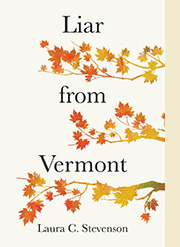A New Series: One Minute Reviews of
Books by Vermont Authors
Laura's column "One Minute Reviews" has appeared bi-weekly in Wilmington, Vermont's Deerfield Valley News since 2015. In April 2018, she found that no Vermont periodical consistently reviews all commercially published fiction and non-fiction by Vermont authors, so she started a series to fill that void. Published reviews from that series and some earlier reviews of local authors are listed with links to a scan of the printed copy. Reviews still in queue are listed without links until they appear in print.
The books reviewed in this series are available through Wilmington's Pettee Memorial Library, the Whitingham Free Public Library, and locally owned Bartleby's Books in Wilmington.
Deerfield Valley News, 2/20/2020
Winter Expeditions in 1776 and 2015
Sam Brakeley, Skiing with Henry Knox: A Personal Journey Along Vermont's Catamount Trail. Islandport Press, 2019
Sam Brakeley's long-time girlfriend has just completed her medical studies at Dartmouth-Hitchcock. Now she has accepted a residency in Salt Lake City, thousands of miles from the Vermont landscape and the extended family Sam loves. Soon, he is going to have to decide whether to stay or to go. Deciding that he needs a period of quiet reflection, he takes a solitary mid-winter cross-country ski trip along the full length of Vermont's 300-mile Catamount Trail. Well, not quite solitary. Long interested in the Revolutionary War, Brakeley likes to recreate past wilderness experience in the present, as is attested by his 2105 book In The Wake of America's Hannibal: Tracing Benedict Arnold and the 1775 Expedition to Quebec by Canoe. For his ski trip, he chooses another eighteenth century traveling companion: 25-year-old Colonel Henry Knox. Knox was celebrated in 1776 for leading an expedition that hauled the artillery captured at Fort Ticonderoga to Cambridge, Massachusetts, where George Washington's army used it to drive the British out of Boston. The two trips, while different geographically, are of similar length and undertaken at a similarly difficult time of year. And to Brakeley, one of the chief inspirations of Knox's expedition is that the colonel deeply loved his young wife and was distressed at the choices that kept them apart.
Skiing With Henry Knox alternates descriptions of Brakeley's own adventure with recreations of Knox's difficult journey. The technique offers, among other things, an interesting perspective on the Revolutionary War. Brakeley's readers learn that Henry Knox was one of George Washington's few close friends. They are forced to consider the difficulties of moving heavy cannons in sledges pulled by oxen or horses along trails mired by thaws or clogged by snowstorms, and to re-experience the dangers of transporting them across rivers that might or might not be frozen. Knox's hard-learned experience with transporting the cannons across the Hudson served him well later in the Continental army's famous crossing of the Delaware River. Soldiers attributed much of the attack's success not only to Knox's handling of artillery, but also to his stentorian voice, which kept the troops together as they battled with the storm and the current.
Brakeley chronicles his own journey in a day-by-day description, enhanced by a series of maps of the Catamount Trail. As he progresses, readers experience the difficulties of winter travel along with him. Primary among them is cold. For all but one night, Brakeley camps out with no shelter beyond his down sleeping bag and his light tent, and as he gets further north, the temperature falls to −22. His ski boots become so cold that he has to take them into his sleeping bag so he can get them on. The sleeping bag itself takes on his body's moisture and freezes to itself during the day. To keep his nightly journal, he writes a few words, then warms his hands in his sleeping bag so he can write more—a fact that makes readers appreciate the efforts of the ox driver who kept a journal as he traveled with Knox's expedition. But despite the cold, there are wonderful moments in both journeys, in which people welcome the travelers, offer them food and warmth, and cheer them on their way. Brakeley may have no cannons to shoot off in thanks, but his book is a grateful testimony to the many people who appreciate the energy and determination of young men's adventures.


